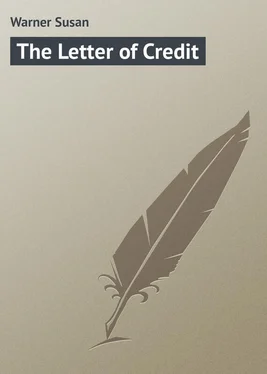Susan Warner - The Letter of Credit
Здесь есть возможность читать онлайн «Susan Warner - The Letter of Credit» — ознакомительный отрывок электронной книги совершенно бесплатно, а после прочтения отрывка купить полную версию. В некоторых случаях можно слушать аудио, скачать через торрент в формате fb2 и присутствует краткое содержание. Жанр: foreign_prose, на английском языке. Описание произведения, (предисловие) а так же отзывы посетителей доступны на портале библиотеки ЛибКат.
- Название:The Letter of Credit
- Автор:
- Жанр:
- Год:неизвестен
- ISBN:нет данных
- Рейтинг книги:5 / 5. Голосов: 1
-
Избранное:Добавить в избранное
- Отзывы:
-
Ваша оценка:
- 100
- 1
- 2
- 3
- 4
- 5
The Letter of Credit: краткое содержание, описание и аннотация
Предлагаем к чтению аннотацию, описание, краткое содержание или предисловие (зависит от того, что написал сам автор книги «The Letter of Credit»). Если вы не нашли необходимую информацию о книге — напишите в комментариях, мы постараемся отыскать её.
The Letter of Credit — читать онлайн ознакомительный отрывок
Ниже представлен текст книги, разбитый по страницам. Система сохранения места последней прочитанной страницы, позволяет с удобством читать онлайн бесплатно книгу «The Letter of Credit», без необходимости каждый раз заново искать на чём Вы остановились. Поставьте закладку, и сможете в любой момент перейти на страницу, на которой закончили чтение.
Интервал:
Закладка:
Mrs. Carpenter suddenly awoke to the conviction, that Rotha's going to any sort of school was not a thing at present within the range of vision. What was to be done? She thought a great deal about it.
On their way to and from church she had noticed a small bookstall, closed then of course, which from its general appearance and its situation promised a tariff of prices fitted for very shallow pockets. One afternoon she resolutely laid down her work and took time to go and inspect it. The stock was small enough, and poor; in the whole she found nothing that could serve her purpose, save two volumes of a broken set of Rollin's Ancient History. Being a broken set, the volumes were prized at a mere trifle, and Mrs. Carpenter bought them. Rotha had been with her, and as soon as they reached home subjected the purchase to a narrow and thorough inspection.
"Mother, these are only Vol. I. and Vol. V."
"Yes, I know it."
"And they are not very clean."
"I know that too. I will cover them."
"And then, what are you going to do with them? Read them? You have no time."
"I am going to make you read them."
"Well, I would like to read anything new," said Rotha; "but what shall we do for all that goes between No. I. and No. V.?"
"We will see. Perhaps we can pick them up too, some time."
The reading, Rotha found, she was to do aloud, while her mother sewed. It became a regular thing every afternoon, all the time there was to give to it; and Rotha was not aware what schooling her mother managed to get out of the reading. Mrs. Carpenter herself had been well educated; and so was able to do for Rotha what was possible in the circumstances. It is astonishing how much may be accomplished with small means, if there is sufficient power of will at work. Not a fact and not a name in their reading, but it was made the nucleus of a discussion, of which Rotha only knew that it was very interesting; Mrs. Carpenter knew that she was teaching her daughter history and chronology. Not the history merely of the people immediately in question, but the history of the world and of humanity. For without being a scholar or having dead languages at her command, Mrs. Carpenter had another knowledge, which gives the very best key to the solution of many human questions, leads to the most clear and comprehensive view of the whole human drama of life and gives the only one clue to guide one amidst the confusions of history and to its ultimate goal and termination. Namely, the knowledge of the Bible. It is marvellous, how that knowledge supplies and supplements other sorts. So Rotha and her mother, at every step they made in their reading, stopped to study the ground; looked back and forward, traced connections of things, and without any parade of learning got deep into the philosophy of them.
History was only one branch of the studies for which Rollin was made a text-book. Mrs. Carpenter had an atlas in her possession; and she and Rotha studied geography. Studied it thoroughly, too; traced and fixed the relations of ancient and modern; learned by heart and not by head, which is always the best way. And Mrs. Carpenter taxed her memory to enable her as far as practicable to indoctrinate Rotha in the mysteries and delights of physical geography, which the girl took as she would the details of a story. Culture and the arts and industries came in for a share of attention; but here Mrs. Carpenter's knowledge reached not far. Far enough to excite Rotha's curiosity very much, which of itself was one good thing. That indeed may be said to have been one general result and fruit of this peculiar method of instruction.
A grammar was not among Mrs. Carpenter's few possessions, nor found on the shelves of the book-stall above-mentioned. Here too she sought to make memory supply the place of printed words. Rollin served as a text- book again. Rotha learned the parts of speech, and their distinctions and inflexions; also, as far as her mother could recollect them, the rules of syntax. Against all this branch of study she revolted, as unintelligible. Writing compositions went better; but for the mechanical part of this exercise Mrs. Carpenter had no leisure. She did set Rotha a copy now and then; but writing and arithmetic for the most part got the go-by. What Mrs. Carpenter did she must do with her fingers plying the needle and her eyes on her work.
It helped them both, all this learning and teaching; reading and talking. It saved their life from being a dead monotony, and their minds from vegetating; and diverted them from sorrowful regrets and recollections. Life was quite active and stirring in the little rooms where they lived. Nevertheless, their physical nature did not thrive so well as the mental. Rotha was growing fast, and shooting up slender and pale, living too housed a life; and her mother began to lose freshness and to grow thin with too constant application. As the winter passed away, and warm weather opened the buds of the trees which in some places graced the city, these human plants seemed to wither more and more.
"O mother," said Rotha, standing at the window one day in the late spring, "I think the city is just horrid!"
"Never mind, my child. We have a comfortable home, and a great deal to be thankful for."
"If I could only see the butterflies in the fields again!" sighed Rotha.
Her mother echoed the sigh, but this time said nothing.
"And I would like a good big tumbler of real milk, and some strawberries, and some of your bread and butter, mother."
"Yes, my child."
"Mother, how comes it that aunt Serena is rich, and you and I are so poor?"
"You have asked me that before."
"But you didn't tell me."
"I told you, it was in consequence of the different marriages we made."
"Yes, I know. But you were not poor before you married father, were you?"
"No."
"Then that is what I mean. What is become of it? Where is your part?"
"Nowhere, dear."
"What became of it then, mother?"
"I never had it, Rotha. You had better get your book and read. That would be wiser than asking useless questions."
"But why didn't you have it, mother? Did aunt Serena – did your sister – get it all?"
"Get your book, Rotha."
"Mother, please tell me. I shall know the answer if you do not tell me."
"Your aunt had it all," Mrs. Carpenter said very quietly.
"Why?"
"Your grandfather thought there were good reasons."
" Were there, mother?"
"I do not think so. But let it be, Rotha, and never mention this subject to me again. Different people have different ways of looking at the same thing; and people are often very honestly mistaken. You must not judge others by yourself."
"Mother, I think that was very unjust," said Rotha, in immediate disregard of this precept.
"You must not think it was meant so."
"But, mother, if a wrong thing is honestly meant, does that make it right?"
"There is but one rule of right and wrong; it is God's rule."
"Then what difference does it make, whether it was 'honestly meant' or no?"
"A good deal, I should say. Don't you think it does?"
"I do not believe aunt Serena means it honestly, though. If she was a good woman, she wouldn't keep what belongs to you. She must know it is wrong!"
"Rotha, you are paining me," said Mrs. Carpenter, the tears springing to her eyes. "This is very foolish talk, and very improper. Get your book."
"I don't wonder you don't want to go and see her!" said Rotha indignantly as she obeyed the order. "O mother! if I could just once roll in the grass again!"
At this moment came a cry from the street – "Straw – berr_ees!_"
"What's that?" exclaimed Rotha springing to the window. "Mother, it's a woman with a basket full of something red. Strawberries! it's strawberries!"
The accent of this word went to the mother's heart.
Читать дальшеИнтервал:
Закладка:
Похожие книги на «The Letter of Credit»
Представляем Вашему вниманию похожие книги на «The Letter of Credit» списком для выбора. Мы отобрали схожую по названию и смыслу литературу в надежде предоставить читателям больше вариантов отыскать новые, интересные, ещё непрочитанные произведения.
Обсуждение, отзывы о книге «The Letter of Credit» и просто собственные мнения читателей. Оставьте ваши комментарии, напишите, что Вы думаете о произведении, его смысле или главных героях. Укажите что конкретно понравилось, а что нет, и почему Вы так считаете.












